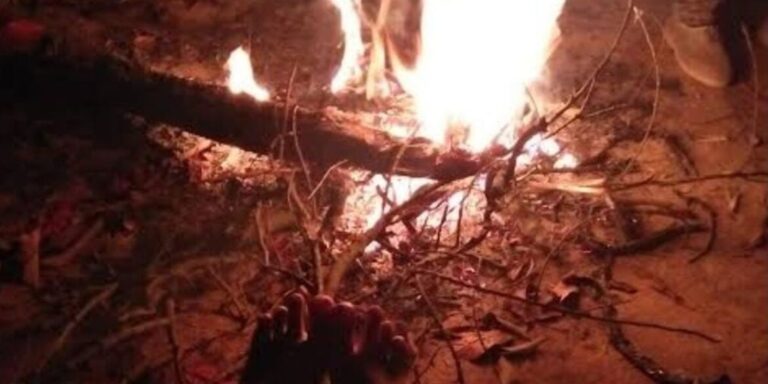There daily, this fixture, at the edge of the road junction, near the tall overhead lights; a square place bursting with the manic energy of the traffic of every type; a strange mix of the vehicular, human and bovine populations that float by every minute along the divided and lined urban spaces, watched by cops and traffic wardens; here comes he, every day—our narrative-subject, almost blending with the flow, not conspicuous, until told…he, being an insignificant part of the chaotic scene that unfolds with every change in the lights; he, being there at that busy intersection, yet not there; a minor element in that crowded venue, yet slightly detached from the sheer madness of the screaming vehicles that try to thread through the congested grid, not ready to follow rules or wait, impatiently honking and cursing or spitting the merry jaywalkers, kids and cows running dangerously among the idling vehicles; here, dear reader, this man seen standing for years together by the shopkeepers and vendors, without a break, early-morn-to-night…yes, yes, there, yes…now look closely: That frail figure, out in the open, on the narrow footpath, standing erect under the Mumbai sun or the rain, along with his modest wares that hardly get a glance from the pedestrians; his age uncertain; features ordinary— white beard and grey thinning hair, face hollow, hands a bit trembling from holding the stout bamboo for hours – a long stick on whose horizontal arms fly the colourful balloons or hankies and vests or cheap glares and mirrors for attracting the attention of the passers-by, and, for selling the trinkets after much haggling with the workers and the low-income folks visiting the market square, from the adjacent suburbs; the bustling markets for the electronic goods and cloth and shoes, both sides of the long road–this old man you will always find at that precise spot, near the signal, along the dusty cross-roads, like a permanent sentry… a hawker who pleads with the prospective clients to buy the cheap wares displayed on the long stick, his mobile open shop, so that the sad widower—as the other vendors with whom he occasionally talks, pitifully comment, got physically thrown out by his greedy sons in most unceremonious manner, after retirement from the postal service; a dream home, three storied, bought by him, now denied; abused and threatened, the old man does not dare visit his own house, usurped by three sons and their families; his legal claim ignored by the cops and the indifferent neighbours—this man, virtually homeless and disowned by family, has to find ways of surviving: he sleeps on the pavement, under a makeshift shelter of cardboard and tarpaulin; goes for the meals in a run-down hotel, twenty minutes away, along the snaking highway but this old greying man— with broken spectacles and dirt-encrusted old shirt and crumpled pyjama and broken irregular teeth and eyes that are blank—surprisingly never charges from poor kids of the workers or adjacent slums that have sprung up near the glistening railway-tracks—simply because these bright kids always remind him of his own grand-children and then he smiles at the children milling around him, remembering the happy mischievous brood of his own, once upon a time, happier times, in another age… .
Sunil Sharma
Sunil Sharma is Toronto-based senior academic, critic, literary editor and author with 24 published books: Seven collections of poetry; five of short fiction; one novel; a critical study of the novel, and, nine joint anthologies on prose, poetry and criticism, and, one joint poetry collection. He is a recipient of the UK-based Destiny Poets’ inaugural Poet of the Year award---2012. His poems were published in the prestigious UN project: Happiness: The Delight-Tree: An Anthology of Contemporary International Poetry, in the year 2015.
Sunil edits the English section of the monthly bilingual journal Setu published from Pittsburgh, USA:
--- https://www.setumag.com/p/setu-home.html




